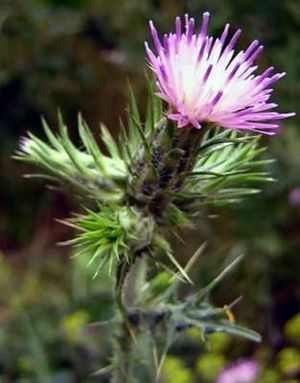Carduus tenuiflorus facts for kids
Quick facts for kids Carduus tenuiflorus |
|
|---|---|
 |
|
| Scientific classification |
|
| Kingdom: | Plantae |
| Clade: | Tracheophytes |
| Clade: | Angiosperms |
| Clade: | Eudicots |
| Clade: | Asterids |
| Order: | Asterales |
| Family: | Asteraceae |
| Genus: | Carduus |
| Species: |
C. tenuiflorus
|
| Binomial name | |
| Carduus tenuiflorus |
|
| Script error: The function "autoWithCaption" does not exist. | |
Script error: No such module "Check for conflicting parameters".
Carduus tenuiflorus, also known as slender-flower thistle, sheep thistle, shore thistle, or winged thistle, is a type of thistle plant. It originally comes from Europe and North Africa. However, it has spread to many other parts of the world. In these new places, it is known as an introduced species and sometimes a noxious weed, which means it can cause problems for local plants and farms.
What is the Slender Thistle?
The slender thistle can grow very tall, sometimes over 2 meters (about 6.5 feet) high. Its stem has ridges and is covered with long, sharp spines that can be several centimeters long. The leaves are a dull olive-green color. They look wrinkled and can often fold or crease.
This plant produces many flower clusters. Each cluster can have up to 20 flower heads. These heads are somewhat round and covered in wide, spiny leaves called phyllaries. Inside, they are packed with pale pink to bright purple flowers. The slender thistle is a very tough plant. It often grows along roadsides, in fields, and in areas where the ground has been disturbed.
Where Does It Grow?
The slender thistle is native to western North Africa, including northern Algeria, Morocco, and Tunisia. It also grows naturally in many parts of Europe. This includes Belgium, France (and Corsica), Ireland, Italy (including Sardinia and Sicily), the Netherlands, Portugal, Spain (and the Balearic Islands), and the United Kingdom.
Why Is It a "Weed"?
Outside of its native areas, the slender thistle has become naturalized. This means it now grows wild in places like Macaronesia, South Africa, India, Australasia (like Australia and New Zealand), parts of South America, and different regions of the United States.
In some of these new places, it is considered an invasive species. For example, in California, it can grow very quickly and take over areas. This can harm local plants and ecosystems by competing for space and resources.
See also
 In Spanish: Cardo de flor esbelta para niños
In Spanish: Cardo de flor esbelta para niños
 | Claudette Colvin |
 | Myrlie Evers-Williams |
 | Alberta Odell Jones |

